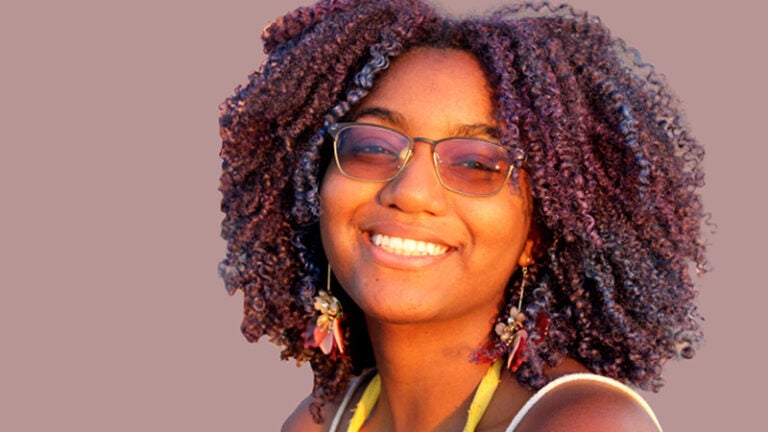
Mellon Mays scholar explores queer culture and Black identity
In the pre-colonial Kingdom of Ndongo, a group of third-gender individuals — quimbandas or chibados — occupied a special status in society. As people believed to be able to communicate with the divine, they advised political leaders and presided over some religious ceremonies.
Born male, they were able to live freely as women and to marry other men if they chose. But with European colonization and missionary ventures came the curtailment of their rights and status, as the Portuguese and others sought to convert African peoples to a religion with stricter views on gender and homosexuality, says Emmy Esquerre.
A junior majoring in anthropology and art history at the USC Dornsife College of Letters, Arts and Sciences, Esquerre is studying Black identity and queer culture, specifically how queer culture in Black communities changed as a result of European colonization, the Inquisition and enslavement in the U.S.
“I think there is a lot of queer phobia in the Black community, especially in Christian Black communities, but it really stems from this fear of sexuality in general because sexuality has been used against Black bodies,” she says. “I think also the fear comes from messages with which Christian missionary and white slave owners inundated enslaved African Americans.”
Esquerre’s work is supported by a Mellon Mays Undergraduate Fellowship.
An open and inclusive family
Esquerre grew up in a household with two mothers and one sister, which she says was fundamental in shaping her views on gender and sexual orientation.
“I think that my family has kind of been the driving force of my research. My parents always had me reading stuff about African American history and they were always exposing me to queer culture,” she says.
And her family’s ties with Christianity — one mother was raised as a Jehovah’s Witness and Esquerre’s extended family includes a number of Baptists and Methodists — prompted her to want to explore the intersection of religion and sexuality in Black communities, as well as how religion impacted Black Christians’ feelings of identity and self-worth.
“I want to do interviews with Black queer individuals and [ask] how they have formed their spirituality. What does their faith mean to them and how has it impacted their sexuality?” she says.
She specifically wants to conduct more inclusive research than what has traditionally been done. “A lot of the research about how Christianity impacts Black people is through a gendered, male, homosexual lens, and it doesn’t account for trans bodies, usually. It doesn’t account for lesbian women or nonbinary or fem-identifying queer people — all the variations.”
The roots of racism and anti-queer sentiment
To understand many of the views of homosexuality and queer culture expressed in Black communities today, one must go back 500 years to the era of Christian missionaries, the Inquisition and European colonization, Esquerre says. Inquisition records provide a detailed account, giving us clues as to how attitudes toward homosexuality changed as a result of the imposition of Western religion on the peoples of Africa and its spread into the areas the New World, like the U.S. and Brazil, to which they were sent as slaves.
“There were inquisition records of, ‘Oh, this individual’ — they didn’t call them quimbandas — ‘this individual was killed because he was seen fraternizing with another male.’ I think that through law enforcement, through the church, in the Inquisition and through violence, they were able to really enforce that this is not what we want in our society,” she explains.
But not all colonies treated queerness the same. There were some Latin American colonies where enslaved Black people kept elements of African spirituality, through Voodoo and Santería, for example, and where there were more instances of non-normative queer relationships, Esquerre says.
“Some of the questions that I’ve been working on a little bit involve what happens when cultures and religions meet each other, especially in hostile conditions, those being colonization,” she says. “What is allowed to stay and what isn’t from each group in a cultural convergence, and why?”
But Esquerre believes Western religion, with its attitudes toward Blackness and sexuality, has had a profound impact on how people across the Black diaspora are coming to terms with the relationships between their spirituality and their sexuality. She hopes to continue this research into graduate school, after which she hopes to become a professor and anthropologist.